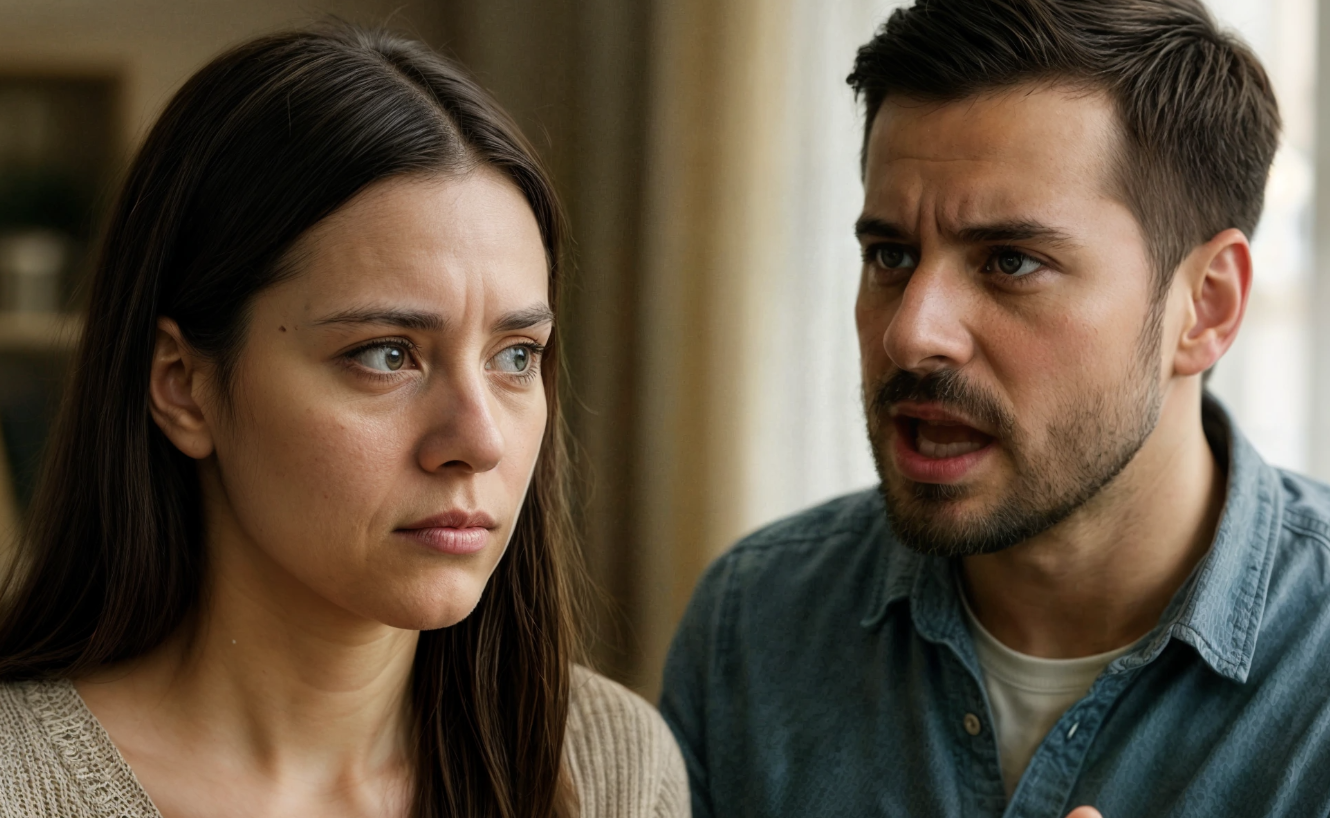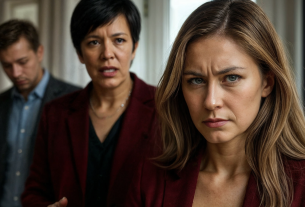“Do you even realize this is betrayal?” Ivan’s voice was shaking, though he was trying to keep himself in check.
Maria stood by the window, looking out at the yard where two girls were kicking a ball and laughing as if the whole world belonged to them. She was holding her phone and staying silent.
“Mash,” Ivan stepped closer and grabbed her by the shoulder. “We’re a family. In a family there’s no ‘yours’ and ‘mine’ when it comes to money. Everything is shared. That’s how it was with my parents, and that’s how it should be with us.”
Maria slowly turned to him. The softness in her gaze was gone—only tiredness remained, and something very sharp, like a needle hidden in a wool mitten.
“With my grandmother, Vanya, it was different,” she said quietly. “She lived alone, managed everything herself. And she respected herself.”
He recoiled as if she’d hit him. Then he laughed—dry, unpleasant.
“Great comparison! An old woman with her cockroaches in her head… You do understand that Anton needs this money now, don’t you? He has no chance of getting back on his feet without help.”
Maria sharply raised her head.
“How much longer are we going to talk about this Anton? He’s a grown man! Not a child you’re supposed to carry on your back for life!”
Ivan sighed, sat on the edge of the sofa and stared at the floor. He didn’t argue—and that was exactly what infuriated Maria the most. It felt like he had already made up his mind and was just waiting for her to give in on her own.
In the silence, the dripping tap in the kitchen could be heard. The water stubbornly counted the seconds, as if ticking down to an explosion.
The first sparks of conflict between them had flared back when Ivan first brought Maria home to meet his family. A big family, tightly bound by the habit of sticking together, accepted her right away—but not as an equal, rather as an extra pair of hands.
“You’re such a capable girl, Mashenka,” his mother, Galina Petrovna, smiled, handing her a bowl of dough. “Come help us, we need young hands.”
Maria had blushed, smiled awkwardly, and rolled up her sleeves. Then she washed mountains of dishes, cleared the table, listened to conversations about how Anton had lost his job again, how he had bad friends, how he needed help. She tried to fit in, but inside her grew a strange feeling: as if they were using her while they went on solving their own problems.
Ivan, on the other hand, glowed—he adored this nest, noisy, smelling of fried onions and always boiling over with conversation. For him, it was home, where everyone breathed in unison. For Maria, it was a cage she couldn’t fit into.
“Mash, you have to understand,” Ivan spoke again, calmer now but with pressure in his voice. “If we buy an apartment just for ourselves, we’ll be betraying my family. Anton will be left without a roof over his head. You don’t want him to end up on the street, do you?”
Maria looked at him and suddenly felt a wave rising inside her—not of tears, but of laughter. Bitter, tearing its way out.
“On the street?” she smirked. “He lives with your parents in a three-room apartment. Eats what your mother cooks. Sleeps in his own room, by the way—a separate one! Where exactly is ‘the street’ in that?”
Ivan frowned, his eyes flashing.
“You don’t get it. He’s having a hard time. He’s depressed.”
Maria stepped closer to him, so that between them there was only air, tight as a stretched string.
“And you think it’s easy for me? When was the last time you asked how I’m doing? What I feel? I’m a person too, Vanya. I’m not your mother; I’m not obliged to babysit your brother!”
He jumped up, his face reddening.
“You’re ungrateful! My family accepted you, they trust you, and this is how you repay them?!”
At that moment the doorbell rang. The sound was sharp, insistent, like someone was trying to chop through the heavy silence. Maria was the first to rush to the door. A man of about sixty stood on the threshold, in a worn-out coat, holding a bouquet of wilted carnations.
“Excuse me,” he said in a hoarse voice, “I’m looking for Maria Petrovna.”
She froze. The stranger was looking straight at her, and there was something strange in his eyes—a mix of confusion and determination.
“I… that’s me,” Maria managed.
“Then these are for you,” he held out the bouquet. “From your grandmother. Or rather, from her friend. She asked me to deliver them.”
Maria automatically took the flowers. They smelled bitter, like ashes.
Ivan exchanged a puzzled glance with his wife.
“Excuse me, who are you?” Maria asked, trying not to let her voice tremble.
“I’m… an old acquaintance of your grandmother’s,” the man hesitated. “We worked together many years ago. I only found out about her death yesterday.”
He coughed awkwardly and added:
“And also… I have an envelope. She asked me to hand it to you personally.”
Maria took the envelope. The paper was worn; on it was her grandmother’s handwriting, which she recognized at once: confident, slightly slanted to the right. Her heart was pounding so loudly it seemed everyone in the apartment could hear it.
Ivan tried to peek over her shoulder, but Maria pressed the envelope to her chest.
“This is mine,” she said firmly.
For the first time in their entire marriage, her voice sounded in such a way that Ivan stepped back.
The stranger said goodbye and left, leaving behind the smell of a wet coat and carnations. Maria closed the door, leaned her back against it, and slowly slid down to the floor.
She tore the envelope open. Inside lay a sheet of paper folded in half. Her grandmother’s handwriting:
“Mashenka, I know that my money may become not only a gift for you, but also a trial. Learn to protect what’s yours. Don’t give it to those who are used to living at someone else’s expense. Remember: I left it to you—so that you could live your own life. With love, Grandma.”
Tears blurred her vision, but the letters burned as if they’d been carved with a knife.
Maria lifted her head. Ivan stood opposite her, frowning, alert.
…
Maria sat in her mother’s kitchen, clutching her mug of tea as if she could squeeze one more drop of warmth out of it. Outside, rain ran down the glass in streaks, and the few passersby hurried by under umbrellas. Her mother was slicing apples onto plates, trying to look calm, but that anxious gleam flickered in her eyes—the one people get when their children are caught in a storm.
“Mash, I can see you’re holding up,” her mother began carefully. “But this is only the beginning. Ivan and his family won’t just let this go.”
Maria sighed.
“Mom, I’m not going back there. Not to him, not to his parents.”
“I understand that,” her mother shook her head. “But they don’t.”
And as if to confirm her words, the phone rang in the hallway. Maria glanced at the screen: “Ivan.” She muted the sound and put the phone back down.
“See?” her mother spread her hands. “You need to be ready.”
Two days later, Ivan showed up in person. He stood at the door in a wrinkled shirt, unshaven, his eyes full of anger and despair.
“Maria!” He was pounding his fist on the door. “You have no right! That money isn’t just yours!”
She didn’t open. She stood behind the door, listening as his voice rose and broke, and she felt fear and determination bubbling inside her at the same time.
A few minutes later Ivan left, but he slipped a note under the door:
“I’ll get my way anyway. If not nicely, then through the court.”
The next day, Galina Petrovna, her mother-in-law, came to the house. She walked in without knocking—she somehow always had a key. Maria’s mother tried to protest, but the older woman swept into the room like she owned the place.
“Maria,” she began in a high, trembling voice, “you just don’t understand. Family is not just husband and wife. Family is all of us. We’ve always lived together, always supported each other. You are obliged to help Anton, otherwise God will punish you.”
Maria rose to her feet. She couldn’t bear it any longer.
“Galina Petrovna, that money is mine. My grandmother left it to me. Not to your son, not to Anton—to me.”
Her mother-in-law frowned.
“Money is a test. And you’ve failed it. You’ve become greedy, just like your father—God rest his soul.”
Those words cut Maria like a knife. She nearly flew at her mother-in-law, but her own mother stepped between them.
“That’s enough!” she said firmly. “I’m the mistress of this apartment. Get out.”
Galina Petrovna threw up her hands, shouted something about ingratitude and curses, then slammed the door so hard that plaster fell from the ceiling.
That evening, as Maria was packing her things into a new bag—she’d decided to move into a rented apartment so she wouldn’t drag her mother into this nightmare—the phone vibrated again. This time it was a number she didn’t recognize.
“Hello?” she said cautiously.
“Maria Petrovna?” a young, ringing female voice asked. “My name is Sveta. I… you don’t know me. I’m Anton’s neighbor.”
Maria tensed.
“And why are you calling me?”
“I just wanted to warn you. Tonight he was sitting outside the building with his friends, loudly discussing how he’s going to ‘squeeze’ money out of you. Said he knows a guy who can help. Looks like he’s serious.”
Maria thanked her, hung up and sat down on the couch. Her heart was thudding. She understood: Anton wasn’t just lazy. He looked for easy ways out, and if someone offered to ‘solve the problem’ by force, he’d agree.
The next day Maria went to see a lawyer recommended by a colleague. The office was crammed with old books, and it smelled of paper and coffee. A man of about forty-five, in glasses and with thoughtful eyes, listened carefully to her story.
“An inheritance is your personal property,” he said, flipping through the documents. “But they’ll put pressure on you morally. They might try to go to court—with the excuse that you’re family, that part of the money should go toward common needs. It’s a losing case for them, but they’ll rattle your nerves.”
Maria lowered her head.
“I’m exhausted. But I won’t give it up.”
The lawyer nodded.
“That’s the right attitude. And also,” he suddenly smiled, “you need to stop being a victim. Not just defend yourself, but act.”
Those words lodged themselves in Maria’s mind.
That same evening she took out her grandmother’s envelope again. She read the letter aloud, as if it were a prayer:
“Don’t give to those who are used to living at someone else’s expense. Remember: I left it to you—so that you could live your own life.”
And suddenly Maria remembered the strange man with the carnations. His face, his look. He hadn’t told her everything. There was a secret there, something left unsaid.
The next day she decided to find him.
She walked along the old streets of the city where her grandmother had once lived. In a small courtyard behind a peeling building, an old woman was sitting on a bench. Maria approached and asked:
“Excuse me, do you know a man… he came to see me, said he had known my grandmother.”
The old woman squinted.
“Tall, gray-haired, in a coat? That must be Semyon. He used to work with your grandmother at the library. Then he disappeared somewhere. And now he’s shown up again. He’s a strange one. But he seems kind.”
Maria thanked her and walked on.
That same evening there was a knock at her door. She opened it—and saw the same man.
“Forgive me,” he said. “I… wanted to give you something else. I didn’t dare last time.”
He pulled a small notebook in a leather cover from his pocket.
“This is your grandmother’s diary. She asked that it go only to you.”
Maria took the notebook, and her heart skipped a beat.
“Why only to me?”
The man looked her straight in the eyes.
“Because there are things in there that could change everything.”
Maria sat on her bed, holding her grandmother’s notebook in her hands. The leather cover was scratched, smelling of dust and something warm and long forgotten. She opened the first page and saw lines written in that familiar hand:
“If these pages have reached you, it means I’m already gone. But you must know this: the money I left you was no accident. It is the result of an old secret I carried my whole life. I didn’t earn it from my pension or from savings. It came to me from a man I loved, a man no one was allowed to know about. Now it’s your responsibility to use it in a way that doesn’t repeat my mistakes.”
Maria felt a chill run down her spine. Semyon had stayed silent, but his eyes had already betrayed his knowledge that day.
That evening Anton called. His voice was hoarse, but there was a certain insolence in it.
“Mash, let’s handle this nicely. Buy me an apartment. You’ll still have plenty left. Otherwise… you know, life is long, anything can happen out there.”
Maria flinched. He was threatening her. First gently, then openly, without any pretense.
“You’re nothing to me,” she said coldly, and hung up.
The phone rang again immediately. Then again. Then a message came: “You’ll regret this.”
The next day she met Semyon in an old teahouse not far from the library. He drank black tea, his hands trembling slightly.
“She was afraid your husband’s family would tear you apart,” he said. “That’s why she wrote those lines.”
“But why were you silent?”
“Because I’m tied to this story too.” He raised his eyes. “I was the man who gave her that money.”
Maria froze.
“You…?”
“Yes. I loved your grandmother. We couldn’t be together, but I helped her however I could. That money was my gratitude to her for her life, for not breaking. And now it’s with you. Don’t let anyone take it away.”
Maria nodded. In her chest, shame, bitterness, and strength mixed together.
A week later, Ivan filed a lawsuit. The hearings were nerve-racking, full of shouting and accusations. Galina Petrovna put on a show, telling how Maria had “destroyed their family.” Anton came to court with puffy eyes and gave the judge pitiful looks.
But the law was on Maria’s side. The judge announced clearly:
“The inheritance is not subject to division. The money remains with Maria Petrovna.”
Anton stormed out of the courtroom, slamming the door. Ivan sat with his fists clenched. Her mother-in-law wept and whispered curses.
Maria, for the first time in a long while, felt she could breathe deeply.
She bought an apartment in a new building. Big and bright, with windows facing a courtyard where, in the mornings, you could hear children playing ball. There was a sofa in the living room, and in the kitchen a large table that had room not only for plates, but for dreams.
Sometimes Semyon called to ask how she was. Sometimes they met, sat on a bench near the library, and simply stayed silent.
And Ivan’s family disappeared from her life like a noisy dream. Only sometimes, in her sleep, she heard her grandmother’s words:
“Live your own life, Mashenka.”
And Maria lived.



